“Borat Subsequent Moviefilm” and the limitations of political comedy
October 30, 2020
 Nora Sullivan Horner
Nora Sullivan HornerJak sie masz! The days are now in the single digits as we wait for the election, and Sacha Baron Cohen decided it was a perfect time to release his new political comedy, “Borat Subsequent Moviefilm: Delivery of Prodigious Bribe to American Regime for Make Benefit Once Glorious Nation of Kazakhstan.” Although I was thoroughly excited to watch the film, I noticed that there were great differences between the two Borat films. The film is in the same vein as its predecessor, but the atmosphere is drastically different from what it was 14 years ago. This made me ask the question: who exactly is this movie for? As a political comedy, it seeks to unveil issues within our current democratic system, but rather than beating around the Bush (get it?), the sequel addresses the current administration more directly. “Borat Subsequent Moviefilm” might be a great comedy for our current era, but as a political film, there’s only so much it can do.
Back in 2005, Sacha Baron Cohen filmed “Borat: Cultural Learnings of America for Make Benefit Glorious Nation of Kazakhstan,” smack dab in the middle of the Bush administration. The film—released in the midst of the midterms of 2006—was meant to be a political one. This film was a cultural phenomenon when it came out, and it’s not just because everyone wanted to make “My Wife!” jokes. The first “Borat” film addressed the issues and vulnerabilities of average America, using the lens of a foreign journalist. Baron Cohen understood that there were systemic problems with America, especially when it came to racism, misogyny, Islamophobia and anti-Semitism. The way he illustrated these issues was nuanced, setting up interviews where Baron Cohen, as Borat, would elicit calculated reactions for his outlandish behavior. The brilliance of “Borat” is not only that he is a hysterical character, but that the conversations he has with people are simply unsettling. Having people at a rodeo cheering for George Bush “drinking the blood of every single man, woman and child of Iraq” is funny only because it is unnerving. Baron Cohen used comedy to call attention to the issues of the United States.
However, in 2020, most people are already more aware of the issues that the United States faces than they were in 2006. This poses a challenge for Baron Cohen’s sequel: how do you enlighten people using the same template? The answer is that you can’t, but more on that in a bit. “Borat Subsequent Moviefilm” does employ many of the same techniques of the original film, but it heightens the role of the celebrity. In the first, the major celebrity of the film was Pamela Anderson, whom Borat wanted to marry after his road trip to meet her in California. However, the sequel needed to address the elephant in the room: the pervasive celebrity of the Trump administration. The focus is on delivering Borat’s daughter, Tutar, as a gift to either “Premier McDonald Trump, Vice Premier Mikhail Pence or Rudolph Giuliani” in order to help the nation of Kazakhstan. The brilliance of the original lies in the interactions between average people, but the sequel gives more credence to pulling stunts involving Trump and his supporters. Does that make it less effective? No; Baron Cohen simply adapted to the times. The era of subtlety is over, and “Borat Subsequent Moviefilm” addresses the glaring problems head on.
This brings me to the issue of the audience. “Borat” managed to have a wide range of viewers, coming from all different backgrounds. The issue is that Baron Cohen’s target group includes those who are willing to address (and poke fun at) deep-seated issues in America. “Borat Subsequent Moviefilm” makes no changes to that audience. If anything, the film is more explicit about alienating Trump supporters. “Borat” ultimately has three types of fans: those who recognize the uncomfortable message that the comedy is addressing, those who do not understand the social commentary but appreciate the surface-level humor and those who find the humor funny, but for the wrong reasons. One of the controversial moments in the sequel includes Borat dressed up as a caricature of a Jew in a synagogue as he has a conversation with a Holocaust survivor. Baron Cohen, a Jewish man himself, explicitly hopes to focus on anti-Semitism in America and demonstrate its irrationality. The issue is that some people find this scene funny because they believe the anti-Semitic stereotypes expressed by this character, rather than simply feeling uncomfortable. I know, deconstructing jokes is not inherently fun, but Baron Cohen’s message is part of the humor. I am not suggesting we need to police who can laugh at jokes. It is completely the opposite: this nation needs to have a good laugh. Unfortunately, when watching Baron Cohen’s comedies, some people miss the point.
“Borat Subsequent Moviefilm” comes at a time where subtlety is not possible. The comedic strategy of the film is much more explicit than the original when expressing its disdain for the Trump administration. Almost all of the fan base has carried over to this sequel, but due to the film’s partisan approach, some of the base will be alienated by its anti-Trump messaging. The real issue comes from the people that do not get the point, even when the message is so direct. That being said, those who understand the problems in our nation expressed in this film have every right to find it funny. “Borat” is meant to be enjoyed, especially during these uncertain times. Dziekuje Ci.

Comments
Before submitting a comment, please review our comment policy. Some key points from the policy: